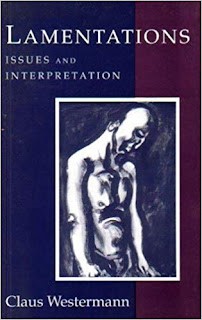I’ve been a bit obsessed with E. Stanley Jones lately, after reading Jack Harnish’s book and chatting with him about it in my podcast, "Maybe I'm Amazed." Exploring the lives of great Christians who lived in other cultures, not mashing them down, but living, being, learning there can revitalize us. Jones’s friendship with Gandhi helped him and us recover much that’s lost about our own faith. Gandhi’s suggestions, that we take Christ seriously, getting the real thing instead of a mere inoculation of the thing, the mild version protecting us? And living in real love and compassion, attentive to others who think differently and learning from them to deepen our own life with God?
How strangely fitting that our first lectionary reading on this Sunday when we ponder God’s worldwide church is Lamentations 1:1-6! This sorrowful dirge over Jerusalem, devastated by the Babylonians, portrays God’s church in haunting ways. “How lonely the city once full, how like a widow, the princess has become a vassal, she weeps bitterly…” Explanations aren’t required; just let the language and images dangle, and even indict. “Her friends have become her enemies.” “No one comes to her festivals.”
The lost majesty, the bitter lot: has the
world simply crept long enough to finally squash us? Or does verse 5 explain
things: “The Lord has made her suffer for the multitude of her transgressions”?
I can’t be sure, and I don’t think the preacher needs to pick. Lift it up, as a
tease or open question: the church is in considerable demise? Is it the world,
the culture, the media, materialism triumphant? Or is it on us for our
timidity, our bungling, our self-serving vapidity? This isn’t negativity, but
the simple, frank truth about God’s church on this day.
It is still God’s, so it is to God we speak. Claus Westermann’s summary assessment of the whole book is spot on: “Lamentations did not arise in order to answer certain questions or to resolve problems. These songs arose as an immediate reactions of the part of those affected by the collapse. The ‘meaning’ of these laments is to be found in their very expression. Questions of a reflective sort arose only secondarily; they are of subordinate important to the lamentation itself. The real significance resides in the way they allow the suffering of the afflicted to find expression.” Then he adds, “That sufferers have been given the opportunity to pour out their hearts before God is seen in the Old Testament as itself an expression of divine mercy.”
While the crushing defeat and destruction of Jerusalem makes our small, “first world problems” look meager, we do experience a similar collapse of the known world. Can we help our people rediscover lament, not to explain things or fix things, but to give people the opportunity to pour out their hearts before God? Here’s what conservative and progressives surprisingly share in common: the crumbling of their world; I heard Walter Brueggemann voice a similar thought on Krista Tippett's On Being a couple of years ago. Conservatives fear when they see their familiar, tried and true world they’ve known and loved crumbling around them – and progressives fear that the world they dream of will never become reality. Conservatives fear the loss of the church they've treasured; progressives fear that the church they yearn for will never come to be. Can a sermon unite them in their shared loss? Is our fractured state the real locus of who we are on World Communion Sunday as we fracture the bread? Can the preacher, in this very simple way (by naming both losses and fears), build a bridge?
In
such agonizing circumstances, relationships matter. Writing from prison, Paul
expresses immense tenderness and an overflow of love for his colleague, his
friend, closer than even a son, in 1
Timothy 2:1-14. In a situation every bit as forlorn as that of ours or the
ancient Judaeans, Paul dwells on tears, his and Timothy’s. He is gravely
concerned that what he and the early Christians are enduring will feel
like shame – which is so often the case. Tears, for Paul, are
the way to joy.
Paul
offers a profound, shocking alternative to shame – inviting Timothy to be
rekindling of the gift within you from the laying on of hands. The Greek (maybe
better rendered “re-igniting”) is anazopureo,
which echoes anamimnesko, to
recall. Reigniting is rooted in recollection. Do clergy preach this? Or simply
reignite their own hopefulness?
Recalling my calling, and all that ramped up to ordination, when hands were laid on me, is a healing salve for me. When we graduated seminary, I do not recall thinking I want to go to meetings, or I want to make budgets, or even I want to preach sermons. Way back then, I really just felt an intense love for Jesus, and wondered if he had any errands I might run for him. Period. Recalling that somehow re-energizes me, at least for a little while. I wonder if the world church... if we can envision such a real entity... might do well to do some recollecting and reigniting, not by digging in institutionally, but by getting younger, freer, nimbler?
We do what we do, not so much by choice, right? Paul is an apostle “because God wills it” (v. 1). God’s spirit isn’t my spirit but God’s – and it isn’t cowardice but power and love. We preachers have a holy calling – “not according to our works” (and dang, have I been working hard!) “but according to his purpose and grace.” Verse 12 clinches it: “God is able” – not “I am able.” How often are we clergy like those vapid disciples, when Jesus asked if they were able? The hymn, “Are ye able?” gets it so very wrong. “Yea, the sturdy dreamers answered… Lord, we are able!” But we are so not able, and there’s no reigniting and lifting of our exhaustion until we own and relish that we are not able. I'll never forget my theology professor, Dean Robert Cushman, declaring this his least favorite hymn.
A
word of caution, if you preach on 2 Timothy: I’ve heard some sermons playing on
Lois and Eunice – sort of Ahh, we
received such great faith from our mothers and grandmothers. But some in
the room most certainly did not. And some of the great faith of our forbears was
deeply flawed – just as the faith we hope to pass on to our families, or to our
church people, is similarly flawed.
And if you’re like me, you’ll have to work not to giggle over the name Lois – as I can never get that famous Family Guy scene where Stewie is trying to get his mom’s attention…
I
am unsure how to warm into the Gospel reading, Luke 17:5-10. Increase our faith – implying it’s
quantifiable. Who has more, and what is the measure/evidence? Casting trees
around? Is Jesus’ point Do your duty?


.PNG)







No comments:
Post a Comment
Note: Only a member of this blog may post a comment.